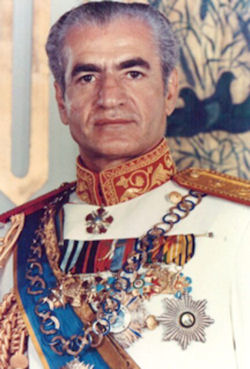1964-74 - Foreign Policy
 In foreign policy, the shah used the relaxation in East-West tensions to improve relations with the Soviet Union. In an exchange of notes in 1962, he gave Moscow assurances he would not allow Iran to become a base for aggression against the Soviet Union or permit foreign missile bases to be established on Iranian soil. In 1965 Iran and the Soviet Union signed a series of agreements under which the Soviets provided credits and technical assistance to build Iran's first steel mill in exchange for shipments of Iranian natural gas. This led to the construction of the almost 2,000-kilometer-long trans-Iranian gas pipeline from the southern fields to the Iranian-Soviet frontier. The shah also bought small quantities of arms from the Soviet Union and expanded trade with East European states. Although Soviet officials did not welcome the increasingly close military and security cooperation between Iran and the United States, especially after 1971, Moscow did not allow this to disrupt its own rapprochement with Tehran.
In foreign policy, the shah used the relaxation in East-West tensions to improve relations with the Soviet Union. In an exchange of notes in 1962, he gave Moscow assurances he would not allow Iran to become a base for aggression against the Soviet Union or permit foreign missile bases to be established on Iranian soil. In 1965 Iran and the Soviet Union signed a series of agreements under which the Soviets provided credits and technical assistance to build Iran's first steel mill in exchange for shipments of Iranian natural gas. This led to the construction of the almost 2,000-kilometer-long trans-Iranian gas pipeline from the southern fields to the Iranian-Soviet frontier. The shah also bought small quantities of arms from the Soviet Union and expanded trade with East European states. Although Soviet officials did not welcome the increasingly close military and security cooperation between Iran and the United States, especially after 1971, Moscow did not allow this to disrupt its own rapprochement with Tehran.
In 1964 the shah joined the heads of state of Turkey and Pakistan to create an organization, Regional Cooperation for Development (RCD), for economic, social, and cultural cooperation among the three countries "outside the framework of the Central Treaty Organization." The establishment of RCD was seen as a sign of the diminishing importance of CENTO and, like the rapprochement with the Soviet Union, of the shah's increasing independence in foreign policy. The three RCD member states undertook a number of joint economic and cultural projects, but never on a large scale.
The shah also began to play a larger role in Persian Gulf affairs. He supported the royalists in the Yemen Civil War (1962-70) and, beginning in 1971, assisted the sultan of Oman in putting down a rebellion in Dhofar (see Historical Background , ch. 5). He also reached an understanding with Britain on the fate of Bahrain and three smaller islands in the Gulf that Britain had controlled since the nineteenth century but that Iran continued to claim. Britain's decision to withdraw from the Gulf by 1971 and to help organize the Trucial States into a federation of independent states (eventually known as the United Arab Emirates--UAE) necessitated resolution of that situation. In 1970 the shah agreed to give up Iran's long-standing claim to Bahrain and to abide by the desire of the majority of its inhabitants that Bahrain become an independent state. The shah, however, continued to press his claim to three islands, Abu Musa (controlled by the shaykh of Sharjah) and the Greater and Lesser Tunbs (controlled by the shaykh of Ras al Khaymah). He secured control of Abu Musa by agreeing to pay the shaykh of Sharjah an annual subsidy, and he seized the two Tunbs by military force, immediately following Britain's withdrawal.
This incident offended Iraq, however, which broke diplomatic relations with Iran as a result. Relations with Iraq remained strained until 1975, when Iran and Iraq signed the Algiers Agreement, under which Iraq conceded Iran's long-standing demand for equal navigation rights in the Shatt al Arab, and the shah agreed to end support for the Kurdish rebellion in northern Iraq.
With the other Persian Gulf states, Tehran maintained generally good relations. Iran signed agreements with Saudi Arabia and other Gulf states delimiting frontiers along the continental shelf in the Persian Gulf, began cooperation and information-sharing on security matters with Saudi Arabia, and encouraged closer cooperation among the newly independent Gulf shaykhdoms through the Gulf Cooperation Council.
To enhance Iran's role in the Gulf, the shah also used oil revenues to expand and equip the Iranian army, air force, and navy. His desire that, in the aftermath of the British withdrawal, Iran would play the primary role in guaranteeing Gulf security coincided with President Richard M. Nixon's hopes for the region. The Nixon Doctrine, enunciated in 1969, sought to encourage United States allies to shoulder greater responsibility for regional security. Then, during his 1972 visit to Iran, Nixon took the unprecedented step of allowing the shah to purchase any conventional weapon in the United States arsenal in the quantities the shah believed necessary for Iran's defense (see Foreign Influences in Weapons, Training, and Support Systems , ch. 5). United States-Iranian military cooperation deepened when the shah allowed the United States to establish two listening posts in Iran to monitor Soviet ballistic missile launches and other military activity.
|
NEWSLETTER
|
| Join the GlobalSecurity.org mailing list |
|
|
|

